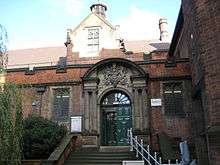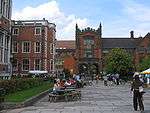Hatton Gallery
The Hatton Gallery is Newcastle University's art gallery in Newcastle upon Tyne, England. It is based in the University's Fine Art Building.
 | |

| |
| Established | 1925 |
|---|---|
| Location | Newcastle upon Tyne, England |
| Coordinates | 54.9796°N 1.6150°W |
| Type | Art museum |
| Curator | Emily Marsden |
| Public transit access | Bus, Metro |
| Website | www |
| Great North Museum | |
The Hatton Gallery briefly closed in February 2016 for a £3.8 million redevelopment and reopened in 2017.
History

The Hatton Gallery was founded in 1925, by the King Edward VII School of Art, Armstrong College, Durham University (Newcastle University's Department of Fine Art), in honour of Richard George Hatton, a professor at the School of Art.[1]
Richard Hamilton's seminal Man, Machine and Motion was first exhibited at the Hatton in 1955 before travelling to the ICA,[2] so the Hatton can claim to have been the birthplace of Pop Art.
In 1997, the University authorities voted to close down the gallery, but a widespread public campaign against the closure, leading to a £250,000 donation by Dame Catherine Cookson, ensured the survival of the gallery.[3]
As part of the Great North Museum project, the gallery's future is secure. Unlike the university's other collections, the Hatton Gallery was not transferred into the Hancock, but remained in the Fine Art Building.[4]
The Hatton Gallery closed on 27 February 2016 for a £3.8 million redevelopment and reopened in October 2017 with the exhibition Pioneers of Pop.[5][6]
Exhibitions
The permanent collection comprises over 3,500 works, from the 14th century onward – including paintings, sculptures, prints and drawings[7] – and starring the Merzbarn, the only surviving Merz construction by Kurt Schwitters, which was rescued from a barn near Elterwater in 1965[8] and is now permanently installed in the gallery.
Other important artists represented in the collection include Francis Bacon, Victor Pasmore, William Roberts and Paolo di Giovanni, Palma Giovane, Richard Hamilton, Panayiotis Kalorkoti, Thomas Bewick, Eduardo Paolozzi, Camillo Procaccini, Patrick Heron and Richard Ansdell. Watercolours by Wyndham Lewis, Thomas Harrison Hair and Robert Jobling are also held.[9]
Important exhibitions held in the gallery in recent years include No Socks: Kurt Schwitters and the Merzbarn (1999)[10] and William Roberts (2004).[11]
Other logos
 The old Hatton Gallery logo, prior to the rebranding as Great North Museum.
The old Hatton Gallery logo, prior to the rebranding as Great North Museum.
References
- "History". Hatton Gallery. Archived from the original on 25 May 2011. Retrieved 20 February 2011.
- Richard Hamilton biography
- "Catherine Cookson throws lifeline to threatened gallery". The Daily Telegraph. 11 June 1997. Archived from the original on 7 February 2008. Retrieved 29 March 2008.
- "Great North Museum". Newcastle University. Retrieved 12 May 2008.
- "Hatton Gallery receives green light for redevelopment". Tyne and Wear Archives and Museums. 28 July 2015. Retrieved 28 January 2016.
- https://www.theguardian.com/artanddesign/2017/sep/28/newcastle-hatton-gallery-reopen-pioneers-of-pop-art
- https://www.newcastlegateshead.com/things-to-do/hatton-gallery-p24631
- Moving the Merzbarn - Fred Brooks
- "Collections". Hatton Gallery. Retrieved 9 May 2012.
- "No Socks Review". The Daily Telegraph.
- Maev Kennedy (15 March 2004). "William Roberts at the Hatton". The Guardian. Retrieved 11 June 2011.
External links
- Hatton Gallery at Tyne and Wear Museums
